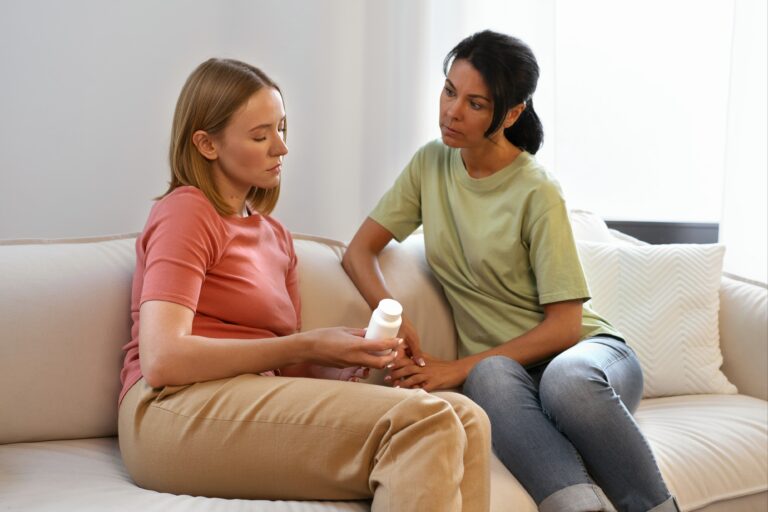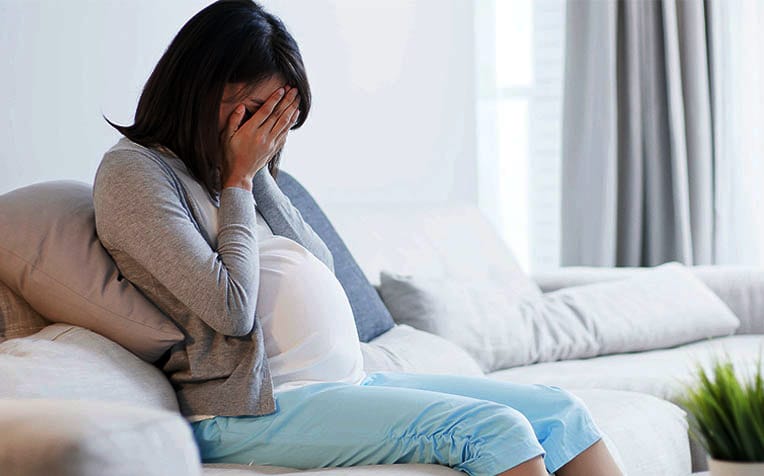Postpartum Depression
“Postpartum” means the period after the birth of a child. Some women experience short-term depression, anxiety, or fatigue after giving birth, sometimes called the “baby blues.” The newborn blues pass in a few days for many women. You may have postpartum depression if these feelings don’t go away or if you experience sadness, hopelessness or anxiety for more than two weeks. It is not normal or expected for a mother to feel depressed after giving birth.
Postpartum depression is a kind of perinatal depression. A major mental health disorder that affects mental, behavioral and physical health is postpartum depression. When you experience depression, feelings of hopelessness and sadness persist, and they can interfere with your daily activities. You may not feel attached to, love or care for your child, or you may feel as if you are not their mother. Feelings range from mild to severe.
The majority of new mothers experience the “baby blues” after giving birth, which include mood swings, crying fits, restlessness and trouble sleeping. The first two to three days after birth is often when the baby blues start, and they can last up to two weeks.
Types of Postpartum Depression
Three types of postpartum depression
- Baby Blues or Postpartum Blues
- Postpartum Depression
- Postpartum Psychosis
- Baby Blues or Postpartum Blues
50% to 70% of mothers experience the “baby blues” in the days immediately following childbirth. Sudden mood swings, such as feeling excited one moment and depressed the next, are possible. You may cry for no reason and experience other negative emotions, including impatience, irritability, restlessness, anxiety, loneliness, and sadness. After birth, the baby blues may last for a few hours or up to two weeks. For baby blues, you often don’t need medical attention.
- Postpartum depression
Postpartum depression, which affects 1 in 7 new parents, is a significantly more severe disorder than the baby blues. If you’ve already had postpartum depression, your chance increases by 30 percent with each pregnancy. In addition to feeling depression or extreme mood swings,
cry a lot, having trouble connecting with your child, cutting off contact with friends and family, loss of appetite or eating too much, lack of sleep, often called insomnia, or excessive sleep, extreme tiredness or lack of energy, less enthusiasm and enjoyment for the things you used to enjoy, extreme irritability and anger, fear of not being a good mother frustration, feelings of inadequacy, guilt, shame, or inadequacy, decreased ability to concentrate, think clearly, or make decisions anxiety, extreme fear and panic attacks, thoughts of harming yourself or someone’s child, persistent suicidal or death thoughts. A week after delivery, symptoms may gradually develop, or even up to a year later, in severity. Treatment with psychotherapy or antidepressants is very successful, even if symptoms persist for several months.
- Postpartum Psychosis
Postpartum psychosis is a very serious type of postpartum depression that requires emergency room treatment. Symptoms usually begin soon after birth and are severe and last anywhere from a few weeks to several months. The symptoms may occur, a feeling of disorientation and confusion, constantly paying attention to your child, experiencing deception and deception, having trouble sleeping, hyperactive and agitated, to be suspicious, attempting to harm yourself or your child. Because postpartum psychosis increases the risk of suicide and injury to the unborn child, it requires remote medical treatment. Medication, psychotherapy, and hospitalization are typical forms of treatment.
Causes of Postpartum Depression
The exact causes of postpartum depression are unknown. Changes in hormone levels can alleviate symptoms of postpartum depression. When you are pregnant, the female hormones progesterone and estrogen are at their highest levels. Hormone levels quickly return to their pre-pregnancy levels within the first twenty-four hours after birth.
- Genetics:
Components of your body’s cells called genes are where the instructions for how your body develops and functions are stored. Parents pass their genes to their offspring. People who have family members with depression are more likely to develop depression themselves. We call this a family history of depression.
- Physical Changes:
Your body produces hormones as chemicals. After delivery, these hormones return to normal quickly in the first 24 hours. This sudden drop in hormone levels can result in postpartum depression.
- Emotional problems:
Lack of sleep and feeling overwhelmed can make even small problems difficult to handle. You may worry that you will not be able to care for the newborn. It’s possible that you feel less beautiful, that your identity is slipping away from you, or that you no longer have control over your life. Postpartum depression can be exacerbated by any of these problems.
Symptoms of Postpartum Depression
Depression at different stages of life can manifest with symptoms similar to postpartum depression. You may have some of the following symptoms in addition to sadness or depression:
- Not eating or Changes in Appetite
- Sadness, unworthy, or guilty feelings
- Fatigue or lack of energy
- Feeling stressed or overly anxious
- Uncontrollable or excessive crying
- Loss of interest in past interests or hobbies
- Difficulty concentrating or thinking
- Not being interested in your baby or feeling uncomfortable around them
- Restless nights, even when your baby is sleeping.
- Suicidal thoughts or a desire to die
If you think you may be suffering from postpartum depression, contact your doctor. This could be your obstetrician, primary care physician, or mental health professional. Your child’s pediatrician can also help you.
Diagnosis and Tests of Postpartum Depression
Postpartum depression cannot be diagnosed with a single test. Your doctor will make a diagnosis based on the symptoms you tell them. To rule out a medical condition that may be causing your depression, your doctor may order blood or urine tests.
They may ask you a series of questions or perform a depression screening to determine if you have postpartum depression. They will want to know how you and your baby are doing. Communicate honestly and openly with your provider so they can clearly understand your feelings and thoughts. They can help distinguish between normal feelings and symptoms of postpartum depression.
Prevention of Postpartum Depression
Postpartum depression is a common condition that is not always preventable. However, being aware of the symptoms of postpartum depression can help you get prompt treatment and control the illness if needed.
- Postpartum depression can also be prevented in those who are more prone to it by engaging in cognitive behavioral therapy and interpersonal therapy during and after pregnancy.
- Your doctor may recommend an early postpartum checkup after your baby is born to check for signs of depression. If you are diagnosed early, you can start treatment sooner. If you have a history of postpartum depression, your doctor may recommend treatment after the baby is born.
- Get moving and get out of the house to get some exercise.
- Build your relationship with your spouse by making time for each other.
- Limiting or avoiding alcohol consumption.
- When your baby is sleeps, rest or go to sleep.
- When you first arrive home, have fewer guests.
Treatment of Postpartum Depression
Postpartum depression is often treated with medication, talk therapy, or both. How much you breastfeed will affect the medication your doctor prescribes. You may be referred to a mental health professional. Two talk therapy methods that are often helpful for postpartum depression are cognitive behavioral therapy (CBT) and interpersonal therapy (IPT).
Medication for depression, anxiety, and psychosis may be part of the treatment for postpartum psychosis. You may also be hospitalized in a treatment facility for a few days until you stabilize. If this treatment is ineffective, electroconvulsive therapy, or ECT, may be useful.
The severity of postpartum depression can be reduced by strong social support from friends, family and co-workers.
Use of Medications for Postpartum Depression (PPD)
Sometimes doctors prescribe medications to treat symptoms. Antidepressants are the most popular type. Antidepressants can help reduce symptoms of depression, and some of them are safe to take while nursing. Antidepressants may take a few weeks to take effect.
- SSRIs, or selective serotonin reuptake inhibitors, include fluoxetine (Prozac) and sertraline (Zoloft).
- SNRIs, or serotonin and norepinephrine reuptake inhibitors, include desvenlafaxine (Pristiq) and duloxetine (Cymbalta).
- Bupropion (Zyban or Wellbutrin).
- Tricyclic antidepressants (TCAs) include imipramine (Tofranil) and amitriptyline (Elavil).
- Zuranolone (Zurzuvae brand name)
Medicines can only be given if you are being cared for by a doctor or nurse in a clinic. It is not safe to use brexanolone if you are breastfeeding or pregnant. Another possibility is to try zuranolone, the first oral drug approved for the treatment of postpartum depression.
Anxiety before Depression
Depression often precedes anxiety. Over time, constant stress, anxiety, or panic can weaken a person’s mental capacity and result in symptoms of depression. Pregnancy and post-pregnancy is sensitive time for women and the anxiety along with physical strain can lead to depression. There are several underlying variables that both depression and anxiety disorders share, including brain chemistry, genetics and life events. Additionally, the ongoing stress of anxiety can interfere with eating, sleep, and general health, which can precipitate the onset of depressive symptoms. Depression can be prevented by early identification and treatment of anxiety disorders.







